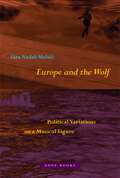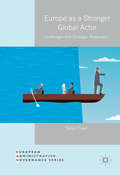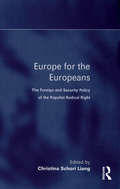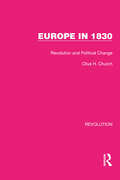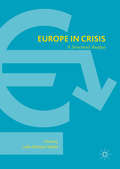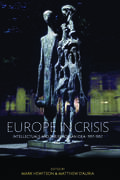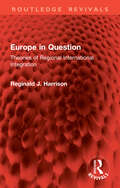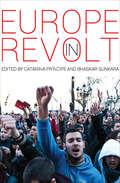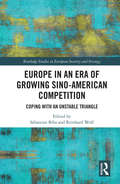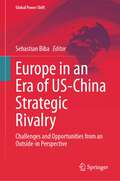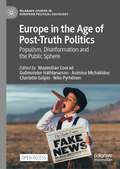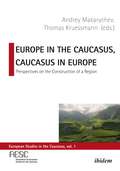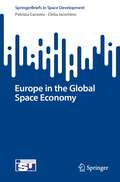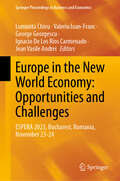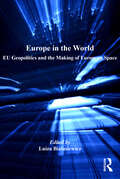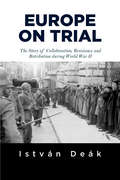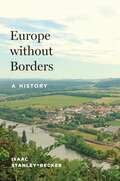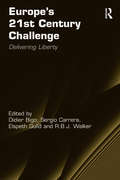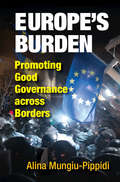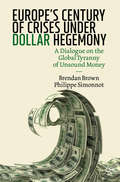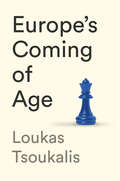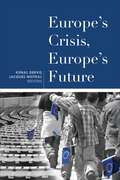- Table View
- List View
Europe and the Wolf: Political Variations on a Musical Figure
by Sara Nadal-MelsióHow the work of several contemporary artists illuminates and challenges the policing of European borders and identityIn this stunningly original book, Sara Nadal-Melsió explores how the work of several contemporary artists illuminates the current crisis of European universalist values amid the brutal realities of exclusion and policing of borders. The &“wolf&” is the name Baroque musicians gave to the dissonant sound produced in any attempt to temper and harmonize an instrument. Europe and the Wolf brings this musical figure to bear on contemporary aesthetic practices that respond to Europe&’s ongoing social and political contradictions. Throughout, Nadal-Melsió understands Europe as a conceptual problem that often relies on harmonization as an organizing category. The &“wolf&” as an emblem of disharmony, incarnated in the stranger, the immigrant, or the refugee, originates in the Latin proverb &“man is a wolf to man.&” This longstanding phrase evokes the pervasive fear, and even hatred, of what is foreign, unknown, or beyond the borders of a community. The book follows the &“wolf&” in a series of relays between the musical, the visual, and the political, and through innovative readings of artworks—by, among others, Carles Santos, Pere Portabella, Allora&Calzadilla, and Anri Sala. Traversed by the musical, these artworks, as well as Nadal-Melsió&’s writing, present unstable symbolic and material ensembles in an array of variations of political possibilities and impossibilities that evade institutions intolerant of uncertainty and wary of diversity.
Europe as a Stronger Global Actor
by Simon DukeThis book considers the principal challenges facing the European Union, which has been buffeted by a series of profound crises, both internal and external. These range from the future of Ukraine, the Union's reactions to China's 'One Belt, One Road' initiative, how to help stabilize countries to its south, and relations with the United States. The core argument is that the EU lacks a meta-narrative that could indicate priorities and linkages between the various continental, regional, national and thematic strategies. As a result, the EU often appears to be a confusing and even contradictory actor to many international partners. In response to these challenges the EU needs to develop a deeper sense of strategic awareness and confidence so that it may give a more convincing response to fundamental questions about the Union's role, purpose and identity in a changing world.
Europe as the Would-be World Power: The EU at Fifty
by Giandomenico MajoneFor fifty years European integration has been pursued according to an operational code based on rules which have never been publicly discussed. This book demonstrates the far-reaching consequences of the prioritisation of integration over competing values, fait accompli and other implicit rules of action. The willingness to sacrifice democracy on the altar of integration is demonstrated by the monopoly of legislative initiative granted to the non-elected Commission. Monetary union preceding, rather than following, political integration is a striking example of fait accompli, and the reason behind many holes in the EU system of economic governance. Until now, academics have avoided radical criticism; Giandomenico Majone argues that only an open acknowledgement of the obsolescence of the traditional methods can stem the rising tide of Euro-scepticism.
Europe for the Europeans: The Foreign and Security Policy of the Populist Radical Right
by Christina Schori LiangFor the last two decades the number of political organizations on the far right, neo-populist right and neo-conservative right has been growing. Along with the mounting electoral success for many of the parties there has also been a growing disenchantment with the political class which has led to a revolt against the current political 'establishment'. The events of September 11, 2001 and the 'War on Terror' have further aggravated tensions within the populations between those who feel they are the 'legitimate' citizens of the state and those who are considered 'outsiders'. The recent expansion of the EU's borders has also brought on fears of a surge of both legal and illegal immigration. All these factors have led to a growing number of cases of harassment and outbursts of violence aimed at asylum seekers and ethnic minorities in Europe. This book measures the effects of neo-populist groups on the current political establishment and illustrates how much political appeal neo-populist views have on making current political policy.
Europe in 1830: Revolution and Political Change (Routledge Library Editions: Revolution #10)
by Clive H. ChurchThis book, first published in 1983, is a valuable corrective to the lack of academic research on the events of 1830 – a year of revolutions across the continent of Europe. Social protests and political changes are examined to note the causes of the political turmoil and revolution in 1830, and then the results of the revolutions’ developments are analysed, as general European social, political and diplomatic crises as well as a series of individual outbreaks. The book also turns to comparative study to look at the hows and wherefores of the revolutions, as the dynamics, participants and effects of revolution are examined in turn.
Europe in Crisis
by Leila Simona TalaniWith contributions from a range of expert scholars in European economics, politics and social policy, this edited collection analyses the crisis in Europe by exploring the structural asymmetries of the Economic and Monetary Union (EMU) and European monetary integration. Structured in two parts, the chapters in this book discuss the impact of the global financial crisis on the Euro area; the failed implementation of the Lisbon Strategy; wage imbalances in the European labour market; the development of EU financial regulation; the Greek debt crisis; and the relationship between Italy and the EMU. The conclusion to the book puts forward a potential way out of the European crisis and argues that the correct measures, thus far, have not been taken to bolster financial stability. In Europe in Crisis, Talani and her contributors aim to identify the impact of the crisis on the future of the EMU and the EU project as a whole.
Europe in Crisis
by Mark Hewitson Matthew D'AuriaThe period between 1917 and 1957, starting with the birth of the USSR and the American intervention in the First World War and ending with the Treaty of Rome, is of the utmost importance for contextualizing and understanding the intellectual origins of the European Community. During this time of 'crisis,' many contemporaries, especially intellectuals, felt they faced a momentous decision which could bring about a radically different future. The understanding of what Europe was and what it should be was questioned in a profound way, forcing Europeans to react. The idea of a specifically European unity finally became, at least for some, a feasible project, not only to avoid another war but to avoid the destruction of the idea of European unity. This volume reassesses the relationship between ideas of Europe and the European project and reconsiders the impact of long and short-term political transformations on assumptions about the continent's scope, nature, role and significance.
Europe in Question: Theories of Regional International Integration (Routledge Revivals)
by Reginald J. HarrisonThis book was originally published in 1974 when there were many theories attempting to explain the problems of international political integration. This book provides a critical analysis of the theories, relating them to relevant hypotheses in politics, economic and sociology. It treats separately functionalism, federalism and contemporary neo-functionalism. The author offers a number of hypotheses which place more stress on the conflicts inherent in late 20th Century international politics and in the domestic politics of Western European societies. Written for postgraduate and undergraduate alike, any terminology is carefully explained or used in a self-explanatory context
Europe in Revolt: Mapping the New European Left
by Daniel Finn Stathis Kouvelakis David Broder Leandros Fischer Hilary Wainwright Luke Stobart David Zachariah Panagiotis Sotiris Petter Nilsson Vidar Thorsteinsson Clément Petitjean Alex de Jong Mark BergfeldThis authoritative survey of the new radical left forming across Europe offers &“ammo for the struggles ahead, not to be ignored&” (Susan Weissman, award-winning journalist and editor of Victor Serge). In Greece, Ireland, Portugal, and Spain, the debt crisis that began with the 2008 global recession helped trigger severe austerity measures. These policies, intended to address government debts, only worsened economic conditions. In response, something happened that few outsiders expected: A massive wave of political resistance erupted across Europe. With mainstream parties largely discredited by their support for austerity, room opened for radicals to offer a left-wing alternative. Collecting provocative, informative, and expert insights from leading scholars across the continent, Europe in Revolt examines the key parties and figures behind this insurgency. These essays and articles cover the roots of the social crisis—and the radicals seeking to reverse it—in Cyprus, England, France, Germany, Greece, Iceland, Ireland, Italy, the Netherlands, Portugal, Spain, and Sweden.
Europe in an Era of Growing Sino-American Competition: Coping with an Unstable Triangle (Routledge Studies in European Security and Strategy)
by Sebastian Biba Reinhard WolfThis book investigates how Europe should position itself in an era of growing Chinese-American rivalry. The volume explores the contemporary relationship and ongoing dynamics between three of the most powerful players in today’s international relations - the USA, China and Europe. It claims that the intensifying antagonism between Washington and Beijing requires a paradigm shift in European strategic thinking, and takes a trilateral perspective in analysing key issue areas, such as trade, technology, investment, climate change, the BRI, sub-national contacts, maritime security and nuclear non-proliferation. Using this analysis, the work seeks to offer original policy recommendations that respond to a number of dilemmas Europe can no longer avoid, including the trade-off between European interests and values in a harsher global environment, the question of whether Europe should align with one of the two superpowers, Europe’s military dependence on a US pivoting to the Asia-Pacific, and possible trade-offs between global and regional governance efforts. The key finding is that Europe must follow a much more pragmatic and independent approach to its foreign and security affairs. This book will be of much interest to students of EU policy, foreign policy, Chinese politics, US politics and IR in general.
Europe in an Era of US-China Strategic Rivalry: Challenges and Opportunities from an Outside-in Perspective (Global Power Shift)
by Sebastian BibaThis volume examines some of the major challenges and opportunities for Europe in the light of the intensifying US-China global strategic rivalry. In doing so, the book investigates European roles and behavior in the contemporary US-China-Europe triangular relationship. While the book's focus is on Europe, the contributors originate from, or are based in, the US and China, thus presenting a unique outside-in perspective to the analysis of European conduct in the areas of security, geo-politics, geo-economics, global governance, development, and climate change. Each area is investigated by one American and one Chinese scholar, respectively, presenting the different views held on Europe’s behavior and positioning in the US and China. In addition to providing critical assessments of Europe’s roles and performance as seen through the prism of their respective country, contributors also pose concrete policy recommendations for Europe.The book will appeal to students, scholars, and researchers of political science and international relations, as well as policy-makers interested in a better understanding of Europe's role in the US-China rivalry and its relationship to the two countries.
Europe in the Age of Post-Truth Politics: Populism, Disinformation and the Public Sphere (Palgrave Studies in European Political Sociology)
by Maximilian Conrad Charlotte Galpin Asimina Michailidou Guðmundur Hálfdanarson Niko PyrhönenThis open access book is the product of three years of academic research that has been carried out in the EU-funded Jean Monnet Network on “Post-Truth Politics, Nationalism and the Delegitimation of European Integration” since 2019. Drawing on the multidisciplinary expertise of the network’s members, the book explores the impact of the phenomenon of post-truth politics on European integration and the European Union. It places particular emphasis on how post-truth politics has played out in the public sphere and asks what impact the phenomenon has had on public deliberation, but reflects also on its implications for democracy in a wider sense. This book is primarily written for audiences with an interest in politics and policy making, including academics, policy makers and civil-society actors. Thanks to its accessible style, the book should however also be an asset to wider audiences.
Europe in the Caucasus, Caucasus in Europe: Perspectives on the Construction of a Region (European Studies in the Caucasus #1)
by Andrey MakarychevThe book series European Studies in the Caucasus offers innovative perspectives on regional studies of the Caucasus. By embracing the South Caucasus as well as Turkey and Russia as the major regional powers, it moves away from a traditional viewpoint of European studies that considers the countries of the region as objects of Europeanization. This first volume emphasizes the movements of ideas in both directions—from Europe to the Caucasus and from the Caucasus to Europe. This double-track frame illuminates new aspects of a variety of issues requiring reciprocity and intersubjectivity, including rivalries between different integration systems in the southern and eastern fringes of Europe, various dimensions of interaction between countries of the South Caucasus and the European Union in a situation of ongoing conflict with Russia, and different ways of using European experiences for the sake of domestic reforms in the South Caucasus. Topics range from identities to foreign policies, and from memory politics to religion.
Europe in the Global Space Economy (SpringerBriefs in Space Development)
by Clelia Iacomino Patrizia CaraveoThis book analyzes the policies and space economy programs of major space-faring nations and explores whether the present institutional set-up in Europe is adequate to address the challenges. At the core of the discussion are the relative roles of governments and markets in a highly dynamic panorama that involves advancements in science, modifications in technology and organization, and the introduction of new rules of behavior. After a close examination of the history of development of the space economy, and the shift from the centralized model to deregulation and the opening up of space activities to commercial companies, a wide-ranging overview of global space governance is provided. National and regional perspectives are discussed, and the current role of commercial actors in the global space system is elucidated. The various challenges faced by Europe are then examined, including the threat posed by institutional and market fragmentation to the emergence of European companies able to compete with companies of nations such as the USA. The final part of the book analyzes proposals for reforming of the space system in Europe and offers a vision for future European space policy.
Europe in the New World Economy: ESPERA 2023, Bucharest, Romania, November 23-24 (Springer Proceedings in Business and Economics)
by George Georgescu Jean Vasile Andrei Luminita Chivu Ignacio De Los Ríos Carmenado Valeriu Ioan-FrancThe transition from traditional economic patterns to a model marked by enhanced efficiency, environmental responsibility, and the adaptation to a “new normal” economic philosophy marks a pivotal moment in understanding Europe’s economic ecosystem within the new world economy. However, the reliance on conventional economic philosophies has often overlooked the broader economic and social landscapes in which these paradigms operate. This volume explores emerging research topics, methodologies, and techniques that are essential to understanding the global economy dynamics and growth patterns under crisis circumstances and persistent uncertainties. Featuring contributions presented at the 2023 International Conference “Economic Scientific Research - Theoretical, Empirical and Practical Approaches” (ESPERA) held in Bucharest Romania in honor of the 50th Anniversary of the National Institute for Economic Research “Costin C. Kiritescu” of the Romanian Academy, this book offers theoretical and practical contributions as well as quantitative and qualitative analyses providing valuable inputs for the design of adequate strategies and policies, aimed to address the future challenges and to capitalize on the emerged opportunities. From sustainable development to digital innovation, this book examines the dynamic landscape of European economics and underscores the significance of interdisciplinary approaches and technological advancements in fostering economic resilience and growth. The contents of this book are of interest to scholars, researchers, students, practitioners, and policy makers in economics and business transformation.
Europe in the World: EU Geopolitics and the Making of European Space (Critical Geopolitics)
by Luiza BialasiewiczThis edited volume provides an innovative contribution to the debate on contemporary European geopolitics by tracing some of the new political geographies and geographical imaginations emergent within - and made possible by - the EU's actions in the international arena. Drawing on case studies that range from the Arctic to East Africa, the nine empirical chapters provide a critical geopolitical reading of the ways in which particular places, countries, and regions are brought into the EU's orbit and the ways in which they are made to work for 'EU'rope. The analyses look at how the spaces of 'EU'ropean power and actorness are narrated and created, but also at how 'EU'rope's discursive (and material) strategies of incorporation are differently appropriated by local and regional elites, from the southern shores of the Mediterranean to Eastern Europe and the Balkans. The question of EU border management is a particularly important concern of several contributions, highlighting some of the ways in which the Union's border-work is actively (re)making the European space.
Europe on Trial
by István Deák Foreword by Norman M. NaimarkForeword by Norman M. Naimark In Europe on Trial, acclaimed historian István Deák presents the comparative history of collaboration, retribution, and resistance during World War II. Deák explores these three themes through the Western and Eastern European countries that suffered at the hands of German military occupation. The occupied countries had to face the question of whether to cooperate with their German occupiers, try to survive the war without any political involvement, or risk their lives by opposing the Nazis. Deák delves deep into the decisions that various countries and individuals made during this critical time. Following the brutal war, Deák discusses the purging of the ancient régime through lynching, acts of private vengeance, denunciation, firings, forced retirements, deprivation of citizens' rights, expulsions, mass deportations, arbitrary internment, and judicial proceedings including the Nuremberg International Military Tribunal from 1945-1946, which judged the principal German war criminals. Europe on Trial helps us to understand the many moral consequences both during and immediately following World War II.
Europe without Borders: A History
by Isaac Stanley-BeckerThe contested creation of free movement—for people and goods—in the Schengen area of EuropeEurope is a place of free movement among nations—or is it? The Schengen area, established in 1985 and today encompassing twenty-nine European countries, allows people, goods, and capital to cross borders without restraint. Schengen transformed European life, advancing both a democratic project of transnational citizenship and a neoliberal project of international free trade. But the right of free movement always excluded non-Europeans, especially migrants of color from former colonies of the Schengen states. In Europe without Borders, Isaac Stanley-Becker explores the contested creation of free movement in Schengen, from treatymaking at European summits and disputes in international courts to the street protests of undocumented immigrants who claimed free movement as a human right.Schengen laid the groundwork for the making of a single market and the founding of the European Union. Yet its emergence is one of the great untold stories of modern European history, one hidden in archives long embargoed. Stanley-Becker is among the first to have access to records of the treatymaking—such as letters between France&’s François Mitterrand and West Germany&’s Helmut Kohl—and Europe without Borders offers a pathbreaking account of Schengen&’s creation. Stanley-Becker argues that Schengen gave a humanist cast to a market paradigm; but even in pairing the border crossing of human beings with the principles of free-market exchange, this vision of free movement was hedged by alarm about foreign migrants. Meanwhile, these migrants—the sans-papiers—saw in the promise of a borderless Europe only a neocolonial enterprise.
Europe's 21st Century Challenge: Delivering Liberty
by Didier Bigo R.B.J. WalkerThis volume presents the final results of the CHALLENGE research project (The Changing Landscape of European Liberty and Security) - a five-year project funded by the Sixth Framework Programme of DG Research of the European Commission. The book critically appraises the liberties of citizens and others within the EU, and the different ways in which they are affected by the proliferation of discourses, practices and norms of insecurity enacted in the name of collective and individual safety. It analyses from an interdisciplinary perspective the impacts of new techniques of surveillance and control on the liberty and security of the citizen. The book studies illiberal practices of liberal regimes in the field of security, and the relationship between the internal and external effects of these practices in an increasingly interconnected world, as well as the effects in relation to the place of the EU in world politics.
Europe's Burden: Promoting Good Governance across Borders
by Alina Mungiu-PippidiThe EU is many things: a civilization ideal to emulate, an anchor of geopolitical stabilization, a generous donor and a historical lesson on cooperation across nations. A fixer of national governance problems, however, it is not. In this book, Mungiu-Pippidi investigates the efficacy of the European Union's promotion of good governance through its funding and conditionalities both within EU proper and in the developing world. The evidence assembled shows that the idea of European power to transform the quality of governance is largely a myth. From Greece to Egypt and Kosovo to Turkey, EU interventions in favour of good governance and anti-corruption policy have failed so far to trigger the domestic political dynamic needed to ensure sustainable change. Mungiu-Pippidi explores how we can better bridge the gap between the Europe of treaties and the reality of governance in Europe and beyond. This book will interest students and scholars of comparative politics, European politics, and development studies, particularly those examining governance and corruption.
Europe's Century of Crises Under Dollar Hegemony: A Dialogue on the Global Tyranny of Unsound Money
by Brendan Brown Philippe SimonnotThis book showcases written dialogue from Brendan Brown and Philippe Simonnot on the subject of European monetary turmoil past and present and what hope there could be for future reform. Starting with the collapse of the gold standard in 1914, proceeding to the brief gold-dollar standard of the mid inter-war years, on to the collapse of Bretton Woods and the heyday of the Deutsche mark and ultimately discussing the euro, this book looks at a broad range of financial history alongside many new and provoking hypotheses about the devastating monetary turbulence of the successive eras, always with a focus on the US monetary hegemon. A highlight of the dialogue is an exploration of how past and future crises could combine to give birth to sound money in Europe – the launch, in effect, of a new euro. In the questions and answers within these pages, the authors draw on global examples and the challenges for Europe in deciding how to adapt to successive monetary shocks from the US, crafting a book that would be of interest to general finance and economics readers alongside students, researchers, and policymakers.
Europe's Coming of Age
by Loukas TsoukalisEuropean integration has had many successes and failures, Brexit being one of the biggest failures. Despite the setbacks, the EU has been acquiring more functions and members and has now reached a stage where it needs to become a political adult. In this book, one of the world&’s leading authorities on Europe provides a lucid and wide-ranging appraisal of contemporary European affairs – of how the EU became what it is today and the key challenges Europeans must now confront. These challenges include the search for a common foreign and security policy that will also require a more symmetrical transatlantic relationship; the search for democracy beyond the nation-state; more inclusive societies; the development of the euro into a fully-fledged currency; a higher degree of autonomy in high technology and the greening of economies. In Tsoukalis&’ view, what is at stake in these challenges is whether the EU can exercise effective political power in a multipolar, highly asymmetrical, and increasingly unstable world, and whether it can find a workable relationship between global markets and domestic social contracts. Willing and able countries should lead the way. The stakes are high – and not just for Europe. A declining and marginalized Europe would not be able to defend fundamental interests and values, including freedom and security for its citizens. And the world would greatly benefit from the moderating influence of a regional power that operates on the basis of broad consensus and compromise. This bold and ambitious book, based on extensive experience of European affairs, will be of value to anyone interested in Europe and its future as well as anyone concerned with the great political challenges of our time.
Europe's Contending Identities
by Andrew C. Gould Anthony M. MessinaHow 'European' are Europeans? Is it possible to balance national citizenship with belonging to the European Union overall? Do feelings of citizenship and belonging respond to affiliations to regions, religions or reactionary politics? Unlike previous volumes about identity in Europe, this book offers a more comprehensive view of the range of identities and new arguments about the political processes that shape identity formation. The founders of European integration promised 'an ever closer union'. Nationalists respond that a people should control their own destiny. This book investigates who is winning the debate. The chapters show that attitudes toward broader political communities are changing, that new ideas are gaining ground, and that long-standing trends are possibly reversing course.
Europe's Crisis, Europe's Future
by Kemal Dervi Dr Jacques MistralThe eurozone crisis started in Greece in 2009-10, spread into Ireland and Portugal, and, from there, quickly spread to the larger economies of Spain and Italy. By the autumn of 2011, it threatened the entire global financial system. In Europe's Crisis, Europe's Future, an international group of economic analysts provides an insightful view of the crisis.How did mismanagement of a crisis in a marginal economy spark such a wildfire? After all, Greece is responsible for only 2% of the eurozone's total GDP, yet the crisis in Athens threatened to grow into a worldwide contagion.Individual chapters describe the onset, evolution, and ramifications of the euro crisis from the perspective of three countries especially hard hit--Greece, Italy, and Spain; the concerns, priorities, and impacts in continental leaders France and Germany; the effects and lessons in key policy contexts--national and international finance and social policies.A concluding chapter by Kemal Dervi discusses the possibility of a renewed vision for the European Union in the 2020s, one that would accommodate the needs of greater political integration in the eurozone within a larger European Union where some countries, such as the United Kingdom, will keep their national currencies.ContentsIntroduction: Kemal Dervi and Jacques Mistral (Brookings) Country Perspectives 1. Greece, by Theodore Pelagidis and Michael Mitsopoulos (Brookings)2. Spain, by Angel Pascual-Ramsay (Brookings and ESADE Business School)3. Italy, by Domenico Lombardi (Centre for International Governance Innovation) and Luigi Paganetto (University of Rome)4. France, by Jacques Mistral5. Germany, by Friedrich Heinemann (Center for European Economic Research) Cross-Cutting Issues6. The Financial Sector, by Douglas Elliott (Brookings)7. Social Policies, by Jacques MistralConclusion, by Kemal Dervi
Europe's Crisis, Europe's Future
by Kemal Dervis Jacques MistralCan the eurozone's emergence from crisis turn into a real economic recovery and a new vision for Europe's future? Or is Europe heading for a "lost decade" in terms of growth and a rise in old style nationalism? Kemal Dervis and Jacques Mistral have assembled an international group of economic analysts who provide perspectives on the most audacious supranational governance experiment in history. Will the crisis mark the end of the dream of "ever closer union" or lead to a renewed impetus to integrate, perhaps taking novel forms?Among the key issues explored are the· Onset, evolution, and ramifications of the euro crisis from the perspective of three countries especially hard hit-Greece, Italy, and Spain.· Concerns, priorities, and issues in France and Germany, the couple that has so far always driven European integration.· Effects and lessons in two key policy areas: banking union and social policies.The volume concludes with a possible renewed vision for the EU in the 2020s, including much greater political integration but where some countries may keep their national currencies and share less of their sovereignty. It is a vision of two Europes within one, ready for the twenty-first century.
